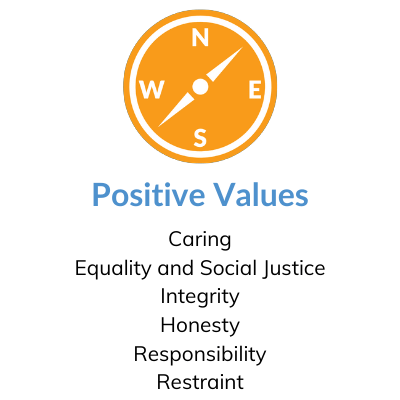Developmental Asset Categories
External Assets: Support | Empowerment | Boundaries & Expectations | Constructive Use of Time
Internal Assets: Commitment to Learning | Positive Values | Social Competencies | Positive Identity
External Assets: Support | Empowerment | Boundaries & Expectations | Constructive Use of Time
Internal Assets: Commitment to Learning | Positive Values | Social Competencies | Positive Identity
Values shape young people’s relationships, behaviors, decisions and sense of self. Although positive values help young people avoid risky behaviors, they also help guide their actions and interactions from day to day. That is why values must inspire and not just prohibit. Young people with positive values are more likely to listen to their conscience, help others, be independent, distinguish between right and wrong, and figure out how to be happy. Lastly, positive values help young people to make their own decisions instead of just imitating their friends or following changing fads. Positive Values is one of the eight asset categories that make up Search Institute’s 40 Developmental Assets, the qualities, experiences, and relationships that help young people grow up healthy, caring and responsible.
Research shows that as young people develop more positive values that guide their behavior, they are more likely to grow up healthy. The Search Institute has identified six key elements in the Positive Values category that are crucial in helping young people excel: Caring, Equality and Social Justice, Integrity, Honesty, Responsibility and Restraint.

Share your ideas for building these assets using @ShelteringWings and #SW40Assets.
Young people need to develop strong guiding values or principles to help them make healthy life choices.
 Follow your good intentions with great deeds.
Follow your good intentions with great deeds.Helping and caring for others can be done in two ways: direct help is when you spend time and interact directly with people who need care. Indirect help is when you collect money, food or other items to give to people who distribute the items to those in need. It is important for young people to be involved in direct and indirect ways that demonstrate their interest in others.
Research shows that young people who place great value on caring for others are more likely to lead and lead by positive behaviors, rather than negative ones. About 50 percent of young people, ages 11–18, say they place a high value on caring for others, according to surveys conducted by the Search Institute. If everyone cared about each other, the world would be a safer, happier and more peaceful place.
Caring for others includes caring for many different people: relatives, neighbors, classmates and people across their communities, states, countries and the world. It can also include taking an interest in animals and the environment. Volunteering — whether for a group or for an individual — is a great way for young people to show that they care about others. But what is the easiest and fastest way to show your interest in others? Just smile at and be kind to those around you.
In your home and family: Volunteer as a family — at an animal shelter, a nature center, a food warehouse for those in need, or another cause you care about.
In your neighborhood and community: Have a garage sale in your neighborhood. Use the proceeds to buy basic necessities or gifts for a local family in need or give the donation to a local charity.
In your school or youth program: Facilitate a reading circle in which middle and high school students spend an hour a week reading to — and interacting with — elementary school children.
 One person can make a difference.
One person can make a difference.Young people who care about equality and work for justice do not allow themselves to forget the disturbing images they see on television. They may not know what life is like for those suffering from these conditions, but they understand it is important to be interested in people — all people. They care about people they don’t know, who live in distant lands and who may have special needs. They want to do something to make the world a better place.
Research shows that young people who place a high value on promoting equality and justice are more interested in others and more willing to help people who are less fortunate. They also grow healthier and becomes better leaders. About 52 percent of young people, ages 11–18, place a high value on promoting equality and reducing hunger and poverty, according to surveys conducted by the Search Institute. Even small steps — if enough people take them — can make a big difference in an effort to provide food and shelter to others.
Ask young people how it feels when others treat them unfairly. Use your answers as a wake-up call to help them find ways they can make a difference in the world. One way we can all help is by giving our time, money or talent to an organization that seeks to reduce hunger, poverty and injustice.
In your home and family: Find out which of the injustices in the world upset your child the most, and help him or her make an action plan to help solve the problem personally.
In your neighborhood and community: Donate food cans and other non-perishable food to your local food store for those in need. Volunteer to serve food at a homeless shelter.
In your school or youth program: Choose a social issue that directly affects or disturbs youth in your classroom or program. Ask them to write letters about the matter to the local newspaper and their state representative, or do something else that can have a positive effect.
 It’s important that young people remain true to their convictions.
It’s important that young people remain true to their convictions.It is one thing to have beliefs and values. It’s a totally different thing to put a firm foot on those values, especially when you feel like you must stick out your neck for them. Any time young people draw on their inner courage and act on their values, they have integrity. History is full of stories about honorable people with integrity. But we should all strive to possess this quality. The best way we can teach young people integrity is to practice it and lead by example. Think about the little things you do every day. If you care about the environment, you show it when you recycle an empty can. If you listen to people say cruel things about someone else, you can demonstrate courage and integrity by pointing out something positive about that person and refusing to join the gossip.
Research shows that young people who have integrity feel good about themselves, make thoughtful decisions and lead others through their positive influence. About 68 percent of young people, ages 11–18, report that they act on their convictions and defend their beliefs, according to surveys conducted by the Search Institute. It is important for all of us to act in a way that reflects our values and beliefs, even when it is difficult.
Be a role model for the young people in your life. Think about what you believe and value. Is being a good friend? Helping vulnerable people? Honesty? Education? Health? Ask yourself if your daily actions truly reflect you and your values. Confidence, trust and respect are the direct results of integrity, and there are many ways adults can help young people cultivate these characteristics.
In your home and family: Talk to your child about a belief or value that you admire and respect about him or her. Think of ways to provide support and positive feedback when your child acts with integrity.
In your neighborhood and community: If you pay attention to a young person who is teased for not doing something that is considered “cool” because it goes against their values, be sure to praise him or her and encourage him or her not to give up.
In your school or youth program: Ask young people to tell you about a time when they acted with integrity, even when it was difficult. Congratulate them for their bravery and integrity.
 Honesty is the best policy.
Honesty is the best policy.Honest people are trustworthy, sincere and genuine. They show dignity and earn respect from peers and others in the community. Although telling the truth is not always easy, it is our duty as adults who care about others to teach young people the value of honesty. Without it, dishonest habits, such as lying and cheating, can become a big problem. Honesty is crucial to success in all areas of life, including positive relationships, education and career.
Research shows that young people are more likely to grow up healthy when they learn to tell the truth, even when it is not easy. Honesty leads to less violence and dependence on alcohol and other drugs. About 66 percent of young people, ages 11–18, say they tell the truth even when it is not easy, according to surveys conducted by the Search Institute. People who are honest value diversity, good health and school success. They are also leaders worth following.
To instill the value of honesty, adults need to talk about it, lead by example and explain why it matters. Work with your family, your school and your community to develop rules about honesty and the consequences of dishonesty. Encourage young people you know to make a personal commitment to tell the truth — and you do the same. Honestly admit your successes and mistakes.
In your home and family: Do not overreact or be accusatory if you suspect your child is lying. Instead, give him or her a chance to tell the truth by asking questions, such as, “Do you think I’m struggling to believe you right now?”
In your neighborhood and community: Set an example of honest behavior. For example, immediately correct the situation if you receive too much change from the cashier at the store.
In your school or youth program: Discuss what being “honest” means to you. Ask young people to discuss if there are situations in which it is better if they tell a “little lie” or not.
 Give young people a chance to take ownership.
Give young people a chance to take ownership.Following the rules is important, but is it just doing what you are asked to do really enough? To become strong, honorable and successful adults, young people must have a personal desire to be responsible. Responsibility is more than following the rules. It means that you are responsible for knowing why you follow the rules and when the rules should be changed — if necessary. But responsibility does not come without its complications. As adults, we must be willing to give young people the opportunity to do their best — sometimes without our help.
Research shows that young people are more likely to excel if they accept and take responsibility for their actions. About 63 percent of young people, ages 11–18, say they accept and take responsibility for their actions, according to surveys conducted by the Search Institute. We should all take opportunities not only to lead by example but to truly teach young people to take care of themselves, keep their commitments and learn from their mistakes.
There are four keys to instilling responsibility in young people, according to authors Don Dinkmeyer, Ph.D., and Gary McKay, Ph.D. In their book, Raising a Responsible Child, they list the following as keys to teaching responsibility: 1. Let young people do things for themselves; 2. Expect it to take time to get things done; 3. Ask, don’t demand; 4. Use natural and logical consequences.
In your home and family: Develop a list of family chores that indicate everyone’s responsibilities, including yours.
In your neighborhood and community: When you make a commitment, keep it. If possible, give more than what you promised. Don’t minimize liability simply because you are a volunteer.
In your school or youth program: When a young person does not take responsibility for his or her actions, do not allow him or her to get away with it. For example, if a task is not completed on time, allow the student to experience the natural consequences of receiving a 0. If he or she asks for an opportunity to raise his or her grade, be sure to make the student truly work for it. If the student does not seek that opportunity, you should not offer it. It would be a great lesson for the student to see how that 0 affects their overall grade.
 Let them know you are there for them — no matter what.
Let them know you are there for them — no matter what.Sex, alcohol and drugs . . . These are topics that most adults would rather not have to discuss with young people. But if parents and other adults who care about them don’t step forward and talk to young people about these things, who will? Make it easy for young people to come to you to talk about the temptations in their lives. Don’t judge. Just listen and educate.
Research shows that young people who abstain from sexual activity and the use of alcohol and other drugs are more likely to grow up healthy. About 45 percent of young people, ages 11–18, believe it is important not to be sexually active, drink alcohol, or use other drugs, according to surveys conducted by the Search Institute. These young people are less likely to chew or smoke cigarettes, to fight, to steal or to be depressed. Furthermore, drinking alcohol and driving or traveling in a vehicle with someone who is under the influence is also less likely to occur when young people practice abstinence.
Communicating with young people about the risks of sex, alcohol and other drugs is important. Don’t just classify them as “bad.” Instead, explain the dangers: having sex can lead to pregnancy and illness; Drinking alcohol or using drugs causes loss of control over their functions, which can result in serious, even fatal accidents; Substance use can also harm the adolescent brain, which is still developing. Work with young people to focus on the long term — not just the moment. Helping them adopt and uphold personal values also makes it easier for them to practice abstinence and not fall prey to negative peer influences. But if they get into trouble with these issues, make sure they know they can come to you for help.
In your home and family: Look for opportunities to respond to messages in the media about sexuality, alcohol and other drugs that do not directly involve your child or friends. Discuss your reaction and ask for your child’s opinion.
In your neighborhood and community: Hold everyone accountable for compliance! Make a pact with your neighbors not to allow alcohol at parties for young people and to report to other parents if you hear or see that local young people are using alcohol or other drugs.
In your school or youth program: Form an after-school group that meets weekly to promote a drug and alcohol free lifestyle, as well as making positive decisions.
Remember that spending time playing and being alone is good for all of us. But so is a structured activity. Help young people find the right mix of the two by presenting them with a variety of options: music, art, and other activities that help them draw on their creative energy, as well as youth programs and spiritual organizations that provide new experiences and teach new skills.
In your home and family: Periodically take an “activity inventory.” Ask your children how happy they are with the different things they do with their time, if the activities in which they participate stimulate and challenge them, if they are making friends with peers and thoughtful adults who care about them and if they are learning new skills while also learning more about themselves.
In your neighborhood and community: Help create a safe and welcoming place where young people can meet with their clubs or other structured activities or just to spend time together. For example, this place could be a park, a playground or a community center.
In your school or youth program: Provide constructive before and after school programs for young people who would otherwise spend their time unsupervised.